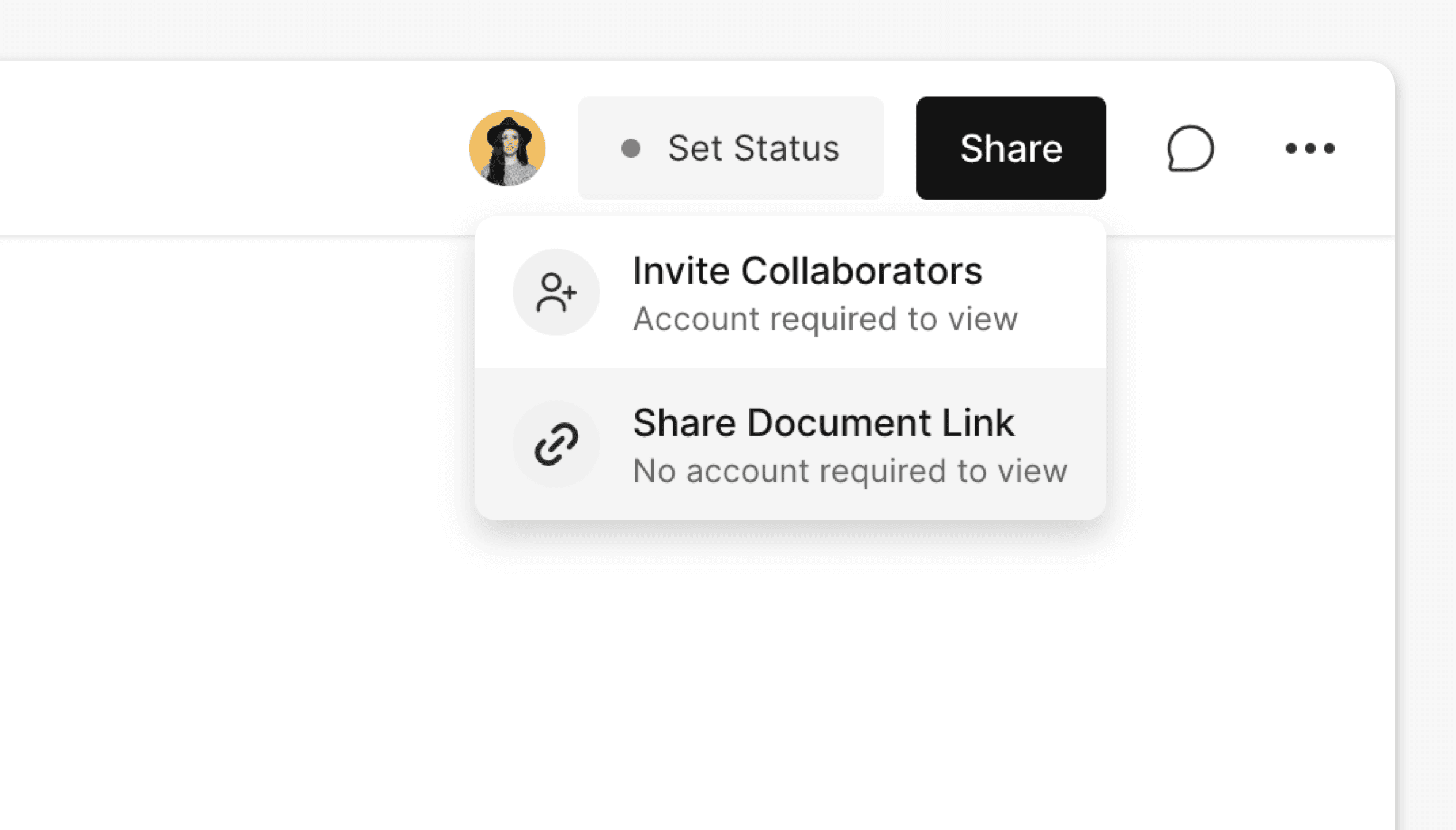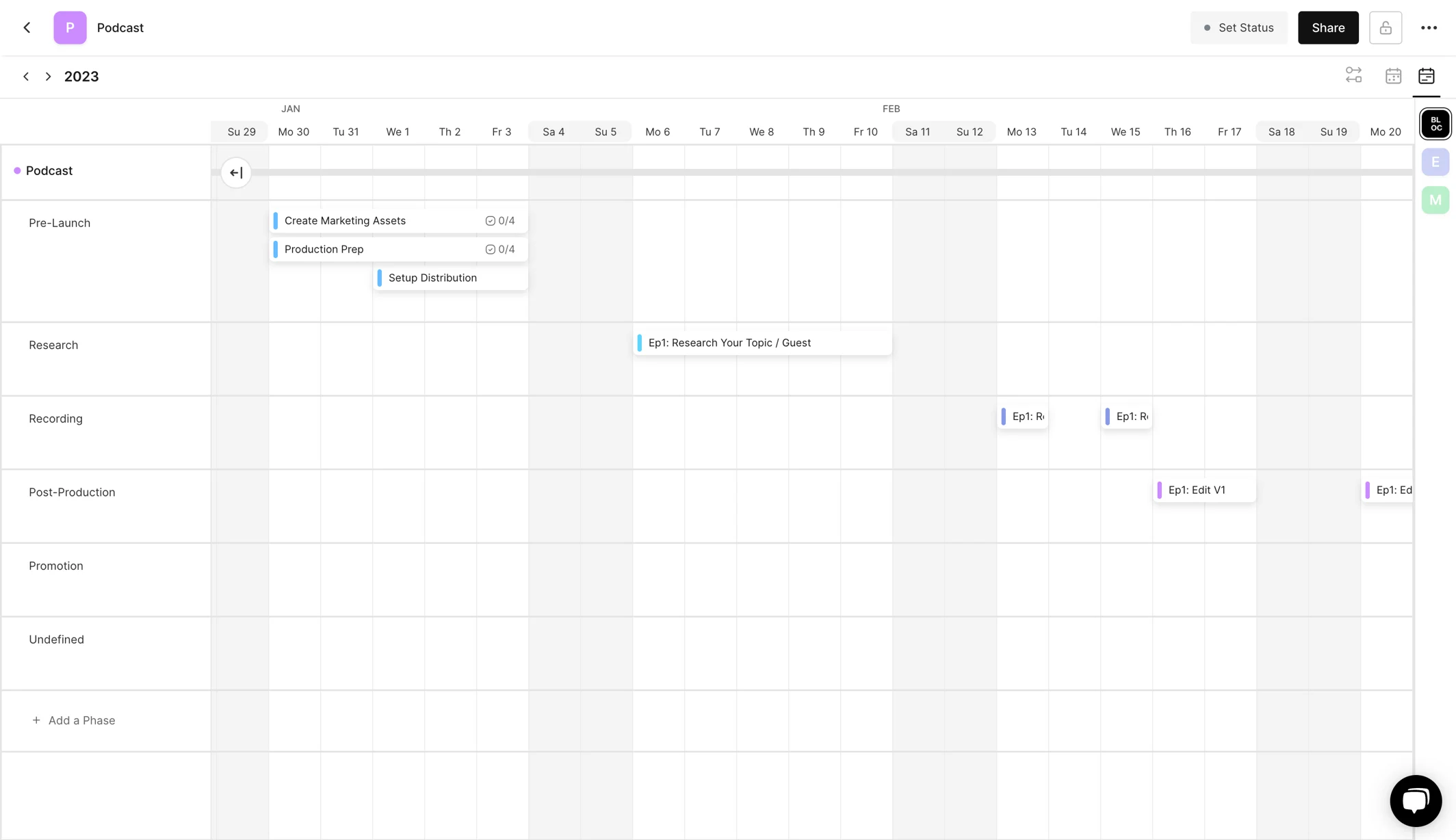
Assemble
Podcast Script and Outline Template
Use our podcast script and outline template to create a structure for your next podcast episode.
Podcasting has opened us up to a world of fascinating conversations from industry leaders around the world. However, great podcasts are still built on the fundamental rules of interviewing, storytelling and entertainment.
Therefore, it's important to have a podcast script template to ensure you create the best content possible to keep your listeners coming back for more. In this template, we provide a fully customizable podcast outline template that will help you plan an outline for your next interview.
Click Use Template now to get started, or keep reading to learn more about writing a podcast script.
Should I Use a Podcast Script Template?
It's rare that you listen to a podcast that has been fully scripted from beginning to end. By nature, podcasts are more free flowing, natural conversations featuring a host, co-hosts, or interviewer and interviewee.
However, this doesn't mean you should wing it. The best podcasts do enormous amounts of research and preparation to ensure they understand their topics and guest's backgrounds or opinions. The goal of a podcast script template is to provide structure so that your dialogue takes the listener on a well planned journey throughout the episode.
Whether you want to write a podcast script with tightly scripted intros and questions, or a more free flowing framework to allow for a conversation that sounds natural, it's a good idea to come prepared with some form of a podcast script. This will ensure that you feel confident and prepared once you hit record and go live.
If you want to access a complete template including sample calendars, task lists, and document templates for every stage of podcast production (including this one), check out our comprehensive Podcast Planning Template.
How Long is a Podcast Script?
Podcast episodes can range anywhere from a few minutes all the way up to a few hours. However, this doesn't mean your script needs to match the length of your final episode. Your podcast script should be as long as it needs to be to cover an outline of all the key points you want to hit. Once you have the outline created, you can let the episode go as long as it naturally needs to go.
The goal of podcast script templates is to simply give you a roadmap for the episode. We recommend having a simple podcast outline template of no more than a couple pages, so that you can stay focused on the key talking points.
Additionally, a podcast script provides a record of the interview, so that you can reference it later when creating show notes or an episode description.
What's Included in our Podcast Outline Template
This fully customizable document includes a podcast outline template that will get you off the ground fast when scripting your next episode. In this template, we include sections for:
Podcast Intro: The intro is typically a word-for-word script introducing the show, hosts or guests. This can vary from episode to episode or be the same intro script every time.
Key Topics: Allows you to break down the structure of your interview into key topics for discussion.
Key Questions: Underneath each key topic, we've included bullet points of key questions or conversation starters, including supporting data and quotes.
Sponsor Message: If you are including a sponsor messages or segues in your podcast, you will want to decide roughly where in the episode you will break for the message. While this is oftentimes added in post-production, it's good to include on your outline so your editor understands where to place it.
Outro: Typically a script concluding the episode and asking people to subscribe, rate and review. You can also include outro music, social media links to your personal or business website, and any other call to action that may be helpful.
How to Use this Template
Typically, writing the podcast script or outline begins during or after the research process.
First, you need to decide whether this podcast will be a solo show, a co-hosted show, or feature guest interviews. This will determine whether your script will be based on topics of discussion or interview questions.
As you are researching your guest or episode topic, you can begin to build an outline of the script structure. First, you may want to answer some key questions around the type of podcast you are producing. Will it be:
A chronological structure following a timeline or life story
A topical structure, covering key topics such as current events
An educational structure, built like a curriculum
Once you've built the key framework, begin filling out the key topics you want to discuss, and then specific questions under each topic. These can serve as conversation starters, but remember to let the podcast episode flow naturally and don't be afraid to go off script if the conversation is interesting.
You can also use your script template for personal notes. You may want to add delivery notes to remind yourself of the tone or personality of the podcast. If it's a storytelling podcast, you may want to add ideas for sound effects or additional content your sound editor can cut in.
Podcast Script Example
Below is an example of a popular podcast to give you inspiration on how to structure your script.
How I Built This
How I Built This always starts with the same intro:
"Welcome to How I Built This, a podcast about innovators, entrepreneurs and idealists, and the stories behind the movements they built. On this show, we’ll explore the motivations, risks, miscalculations, lessons and breakthroughs that come with launching something from scratch. We’ll also find out how they coped with failures, hangups and setbacks – and the often winding paths that eventually lead to success. I’m your host, Guy Raz."
The structure of the "How I built This" podcast interview is designed to go in-depth about how business leaders and entrepreneurs create their companies, whether they fail or succeed. The podcast is formatted in three distinct sections.
First, the host will begin with a brief introduction of the guest, detailing the backstory and accomplishments that led them to success.
Second, an in-depth interview will follow, allowing the guest to tell their story. The host will delve deeply into topics such as the business strategy and growth, conflicts and struggles, personal motivation, successes and lessons learned.
Lastly, the focus will shift to the current status of the business, as well as tips for aspiring entrepreneurs.
Closing out each episode of ‘How I Built This,’ the host, Guy Raz, invites the guest to offer their advice and musings to aspiring entrepreneurs.
Create your Podcast Script with Assemble
Utilize our template to get started fast on scriptwriting.
1. Open the Template
Open this template by clicking Use Template. The template will be created within a new blank project in Assemble.

2. Edit the Template as Needed
Click anywhere within the text to begin adding to or editing the template.

3. Share the Document

4. Save the Updated Template for Future Projects
Next, click the menu in the top right and select Save as Template to save it into your your personal template library.
Producing a Podcast with Assemble
Assemble enables podcasters to create a centralized hub to manage their entire project from start to finish - including documents, calendars, task management and asset management.
By using this template, you'll get access to all of Assemble's powerful features. Assemble helps you keep production moving quickly and efficiently with our advanced collaboration tools built for producers.
Get started for free by clicking Use Template to begin exploring all of Assemble's features today.








